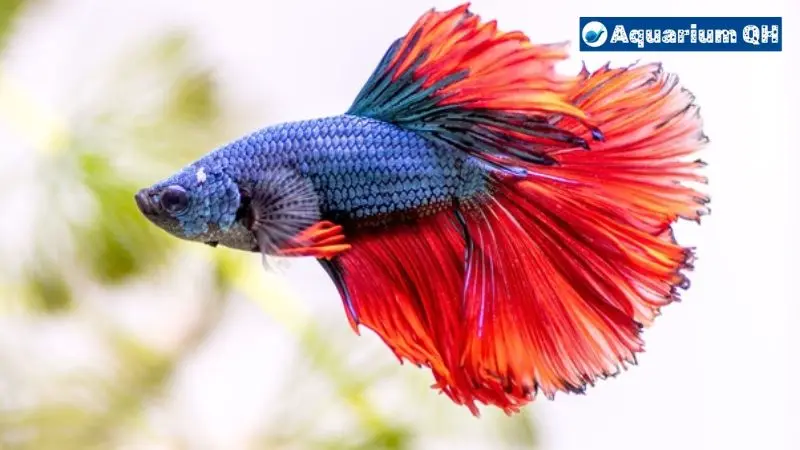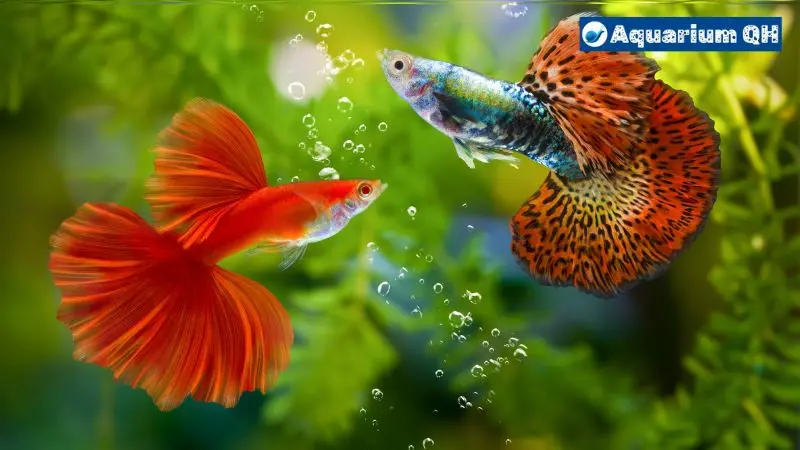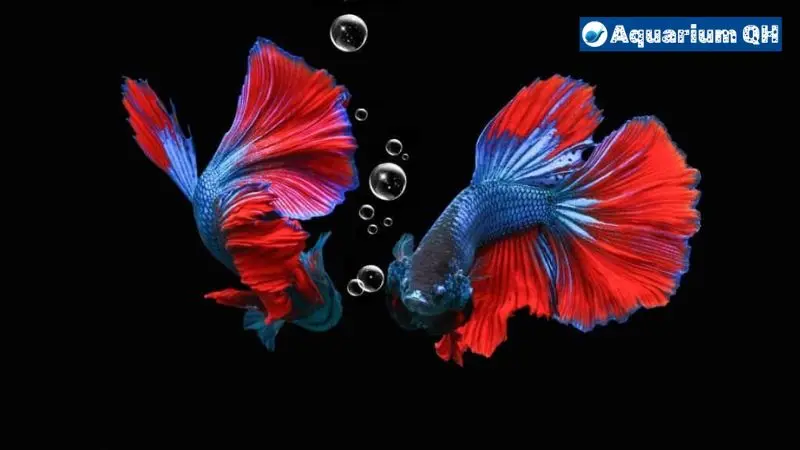Betta fish, also known as Siamese fighting fish, are popular aquarium pets due to their vibrant colors and graceful movements. However, as with any pet, betta fish can exhibit unusual behavior that may cause concern for their owners. One such behavior is hiding behind the filter in their tank. Aquarium QH will explore the reasons for this behavior and provide solutions to ensure the well-being of your betta fish.
Reasons for Betta Fish Hiding Behind Filter
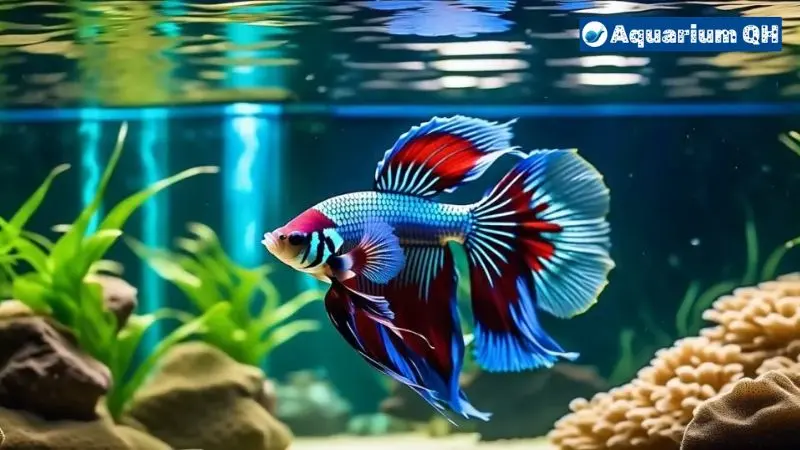
As mentioned earlier, betta fish are known to hide behind the filter in their tank. This behavior can indicate various underlying issues that need to be addressed. Let’s take a closer look at some of the common reasons why betta fish may choose to hide behind the filter.
Stress
Stress is one of the leading causes of betta fish hiding behind the filter. These fish are sensitive creatures and can easily become stressed by changes in their environment. Sudden changes in water temperature, inadequate water quality, overfeeding or underfeeding, and the presence of tank mates that threaten their perceived territory can all contribute to stress in betta fish.
To prevent stress in your betta fish, it is essential to maintain a stable and clean environment for them. Regularly check the water temperature and quality, and make sure to only introduce compatible tank mates. Additionally, avoid overfeeding your betta fish and provide them with a balanced diet.
Insufficient Hiding Spaces
Betta fish require adequate hiding spots to feel secure and avoid feeling exposed. In their natural habitat, they have plenty of vegetation, caves, and other hiding spaces to retreat to when needed. However, in an aquarium setting, these hiding spaces may be limited.
If your betta fish does not have enough places to hide, they may resort to hiding behind the filter for protection. This behavior can also be seen in tanks with aggressive tank mates or in tanks that are too small for the betta fish to establish their territory.
To address this issue, make sure to provide your betta fish with plenty of hiding spaces in their tank. Live plants, caves, and decorations can all serve as suitable hiding spots for your betta fish. Additionally, consider upgrading to a larger tank if you have multiple aggressive tank mates or if your current tank is too small for your betta fish.
Health Issues
Sometimes, hiding behind the filter can be a sign of underlying health problems in betta fish. Parasitic or bacterial infections can cause discomfort and lethargy, leading the betta fish to seek isolation. If you notice your betta fish hiding behind the filter for an extended period, it is essential to check for any signs of illness.
Some common signs of illness in betta fish include loss of appetite, changes in behavior, discoloration, and visible physical abnormalities. If you suspect that your betta fish may be sick, it is crucial to consult a veterinarian who specializes in fish care. They can diagnose and treat any underlying health issues and help your betta fish recover.
Acclimation Stress
When betta fish are first introduced to a new tank, they may hide behind the filter as a way to adjust to their new surroundings. This behavior is entirely normal and should subside as the betta fish becomes more comfortable in their new environment.
However, if your betta fish continues to hide behind the filter for an extended period, it could be a sign of other underlying issues, such as stress or inadequate hiding spaces. Make sure to monitor your betta fish closely during the acclimation process and provide them with a safe and comfortable environment to ease their transition.
Creating a Safe Environment for Your Betta Fish
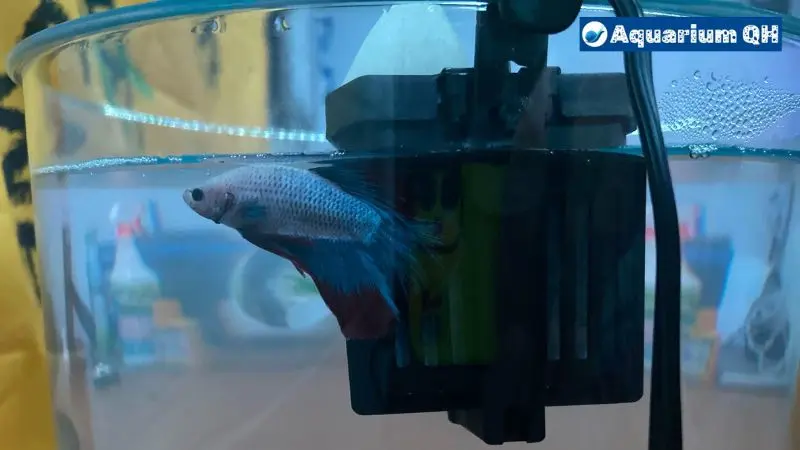
As mentioned earlier, maintaining a stable and clean environment is crucial for the well-being of your betta fish. Here are some essential factors to consider when setting up a tank for your betta fish:
Tank Size
Betta fish require a minimum tank size of 5 gallons, but a larger tank is always better. A larger tank allows for more swimming space and provides ample room for decorations and hiding spots. Additionally, a larger tank can help reduce stress in betta fish by allowing them to establish their territory.
Water Quality
Betta fish are sensitive to changes in water quality, so it is crucial to maintain a clean and well-filtered tank. Regularly test the water parameters, including pH, ammonia, nitrite, and nitrate levels, and make sure they are within the appropriate range for betta fish. It is recommended to do partial water changes of 25% every week to keep the water clean and healthy for your betta fish.
Temperature and Lighting
Betta fish are tropical fish and require a consistent water temperature between 78-80°F. Invest in a reliable aquarium heater to maintain the desired temperature in your betta fish’s tank. Additionally, provide your betta fish with a regular light cycle of 8-12 hours per day to mimic their natural environment.
Decorations and Hiding Spots
As mentioned earlier, betta fish require adequate hiding spaces to feel secure and avoid stress. Live plants, caves, and decorations can all serve as suitable hiding spots for your betta fish. However, make sure to choose decorations that are safe for betta fish and do not have sharp edges or rough surfaces that could harm them.
How to Encourage Your Betta Fish to Come Out of Hiding
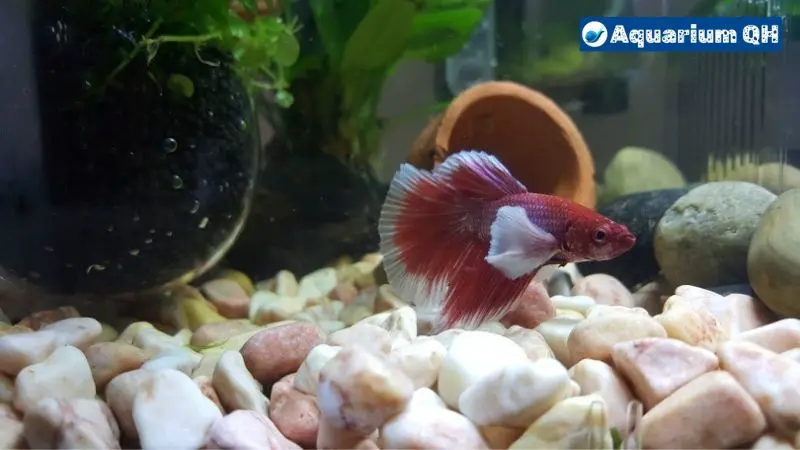
If you notice your betta fish hiding behind the filter, there are a few things you can do to encourage them to come out of hiding and explore their tank:
Provide Adequate Hiding Spaces
As mentioned earlier, betta fish require plenty of hiding spaces to feel secure and avoid stress. Make sure to provide your betta fish with a variety of hiding spots, such as live plants, caves, and decorations. This will give them options to choose from and help them feel more comfortable in their tank.
Add Tank Mates
Betta fish can coexist with other fish, but it is crucial to choose compatible tank mates. Avoid aggressive or fin-nipping fish that could harm your betta fish. Some suitable tank mates for betta fish include peaceful community fish like tetras, corydoras, and guppies.
Create a Routine
Betta fish are creatures of habit and thrive on routine. Try to establish a feeding and light schedule for your betta fish, and stick to it. This will help your betta fish become more comfortable and confident in their environment, reducing the need to hide behind the filter.
Signs of Stress in Betta Fish
Stress in betta fish can manifest in various ways, and it is essential to recognize these signs to address the issue promptly. Here are some common signs of stress in betta fish:
- Hiding behind the filter or other objects in the tank
- Loss of appetite
- Changes in behavior, such as increased aggression or lethargy
- Faded or dull coloration
- Visible physical abnormalities, such as fin rot or bloating
If you notice any of these signs in your betta fish, it is crucial to take action to reduce their stress levels and improve their overall well-being.
Tips for Reducing Stress in Betta Fish
To ensure the health and happiness of your betta fish, here are some tips for reducing stress in them:
Maintain a Clean and Stable Environment
As mentioned earlier, maintaining a clean and stable environment is crucial for the well-being of betta fish. Regularly test the water parameters and perform partial water changes to keep the water clean and healthy for your betta fish.
Avoid Overfeeding
Overfeeding can lead to various health issues in betta fish, including stress. Make sure to feed your betta fish a balanced diet and avoid overfeeding them. A good rule of thumb is to only feed them what they can consume within two minutes.
Choose Compatible Tank Mates
As mentioned earlier, choosing compatible tank mates is crucial for the well-being of betta fish. Avoid aggressive or fin-nipping fish that could harm your betta fish. Additionally, make sure to provide enough hiding spaces for all the fish in the tank to reduce competition and stress.
Importance of Proper Tank Setup for Betta Fish
Proper tank setup is essential for the overall health and well-being of betta fish. As mentioned earlier, betta fish require a minimum tank size of 5 gallons, a stable and clean environment, and adequate hiding spaces to thrive. Investing in the right equipment and providing a suitable environment for your betta fish will not only improve their quality of life but also reduce the likelihood of stress-related behaviors, such as hiding behind the filter.
Conclusion
In conclusion, betta fish hiding behind the filter can indicate various underlying issues, such as stress, inadequate hiding spaces, health problems, or acclimation stress. It is crucial to address these issues promptly to ensure the well-being of your betta fish. By creating a safe and comfortable environment, providing adequate hiding spaces, and monitoring for signs of stress, you can help your betta fish feel more secure and confident in their tank. Remember to always research and educate yourself on the proper care and maintenance of betta fish to ensure they live long and healthy lives.

